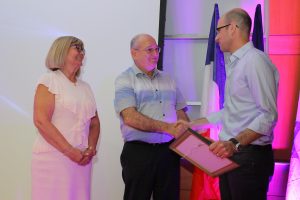Adelis Award to Dr. Yaniv Ziv
The Adelis Award for groundbreaking brain research was presented at Technion to Dr. Yaniv Ziv of the Weizmann Institute of Science

Dr. Yaniv Ziv of the Weizmann Institute of Science
The Adelis Brain Research Award was granted last week at Technion to Dr. Yaniv Ziv, a researcher at the Department of Neurobiology at the Weizmann Institute of Science. The 2019 Brain Research Award was presented to Dr. Ziv by Rebecca Boukhris and Sidney Boukhris, Trustees of the Adelis Foundation and by Technion President Prof. Peretz Lavie. The award ceremony took place at the Technion Board of Governors meeting on June 16, 2019
Prof. Lavie thanked the representatives of the Adelis Foundation for its tremendous contributions to brain research in Israel and for their generous donation to Technion for the establishment of the André Deloro Building for Biosciences, Medicine and Engineering. He said, “The brain, to a large extent, is still a black box, and studies like those of Dr. Ziv give us a glimpse inside that box. This ceremony is an opportunity to congratulate not only the prize recipient but also their mentor, Prof. Michal Schwartz, winner of the 2019 EMET Prize in Life Sciences. Prof. Schwartz also supervised the 2017 Adelis Prizewinner, Prof. Asya Rolls of the Technion’s Rappaport Faculty of Medicine, and the lesson here is that it is important to choose the right mentor.”
Rebecca Boukhris, Trustee of the Adelis Foundation, said that “We are proud to support talented young scientists like Yaniv, and in this way promote and encourage brain research in Israel. The future of Israel depends on its young people because today’s youth will build tomorrow’s world, so it is important to encourage young people to ask, learn, demonstrate curiosity, and broaden their imagination. This is the only way we can expand the circle of excellence that Israel needs.”
The Adelis Foundation, established in 2006 by the late Mr. André Cohen Deloro, of blessed memory, aspires to make a meaningful impact on the lives of Israeli citizens and strengthen Israel as a successful, secure and prosperous nation in the following key areas: scientific and medical research; education; and societal welfare. The Foundation supports academic excellence in Israel, and in particular medical and scientific research. In 2015, in keeping with the legacy of the Foundation’s founder and in loyalty to his vision, the foundation inaugurated the Adelis Brain Research Award which grants $100,000 annually to an outstanding young Israeli researcher.
The purpose of the award is to encourage excellence among young Israeli scientists in the field of brain research; to advance our knowledge and understanding of the brain, its functioning, and the diseases connected with it; and to achieve international scientific impact.

Receiving the award: l-r: Rebecca Boukhris, Trustee of the Adelis Foundation; Technion President Prof. Peretz Lavie, Dr. Yaniv Ziv
Brain research is a leading global scientific research priority.
The award panel of judges comprises senior figures from Israel’s scientific community: Dr. Gal Ifergane, Prof. Moshe Bar, Prof. Illana Gozes, Prof. Eilon Vaadia, Prof. Jackie Shiller, Prof. Rafi Malach, Prof. Noam Ziv, and Prof. Michal Schwartz, veteran leading Israeli brain researchers.
In the award’s fifth year, the Adelis Foundation was both pleased and proud, to witness many high-quality proposals representing Israeli potential in the field of brain research.
The main criteria for the Adelis Prize are excellence, innovation and achievements. The judges had a difficult task, given the diversity of the submissions and their high level. The 2019 award was granted to Dr. Yaniv Ziv, a researcher at the Department of Neurobiology at the Weizmann Institute of Science.
Professor Jackie Shiller of the Technion presented the judges’ decision:
“We are proud to announce Dr. Yaniv Ziv from Weizmann Institute as the 2019 Adelis laureate. The prize committee found Dr. Ziv’s past and present contributions, his long-term goals, and the overall importance of his research to warrant the prize. Dr. Ziv deals with the one of most fundamental and important questions in brain research, how the brain forms new memories, how it maintains these memories stable despite a constant instability in neuronal function. Dr. Ziv uses the most advanced methods to study the neuronal network with high spatial and temporal precision over time. His methods using novel computational approaches including machine learning yielded exciting new insights about how our memories are represented and stored. Despite being a young researcher, Dr. Ziv is already known worldwide and well esteemed for his outstanding contributions to the field”.
Dr. Yaniv Ziv earned a BSc in biology at the Hebrew University of Jerusalem in 2001. He completed a PhD program in neurobiology at the Weizmann Institute of Science in 2007. He was a postdoctoral fellow at the Department of Biology at Stanford University starting in 2008 and joined the Department of Neurobiology at the Weizmann Institute in 2014. His academic and professional honors include the 2007 Otto Schwartz Foundation award for excellence in studies and research, and the Weizmann Institute of Science Award for an outstanding PhD thesis in 2007. He was awarded the Rothschild Foundation postdoctoral fellowship and the Machiah Foundation postdoctoral fellowship. In 2014 he was awarded the Sieratzki Prize for Advances in Neuroscience, and in 2018 appointed CIFAR-Azrieli Global Scholar in the Brain, Mind and Consciousness program. Dr. Yaniv Ziv is married to Dr. Michal Ziv (a clinical psychologist) and has three kids, Romy, Noa and Itamar. Research in Dr. Ziv’s lab focuses on the neural mechanisms of long-term memory.
The main objective of Dr. Ziv’s research, funded by Adelis, is to identify the principles that underlie the storage and organization of information in long-term memory. Towards this goal, the Ziv lab is applying novel optical imaging and computational analysis methods that they have developed. These methods allow tracking the coding properties of large populations of the same neurons over many weeks and analyzing how their joint activity patterns change over time and as a function of experience. Ziv’s current research centers on neural coding in the hippocampus and related cortical circuits that are crucial for spatial navigation and for the formation and processing of memories for places and events. The proposed research aims to represent the structure of relationships between neuronal activity patterns that underlie specific experiences and address fundamental questions that could not have been addressed before. For example: How do hippocampal neural code change during learning, and what aspects of the codes are degraded in forgetting? Can individual neurons be fungible (i.e. mutually interchangeable) for memory storage? And, to what extent are memories of different experiences similarly organized in the brains of different individuals?


